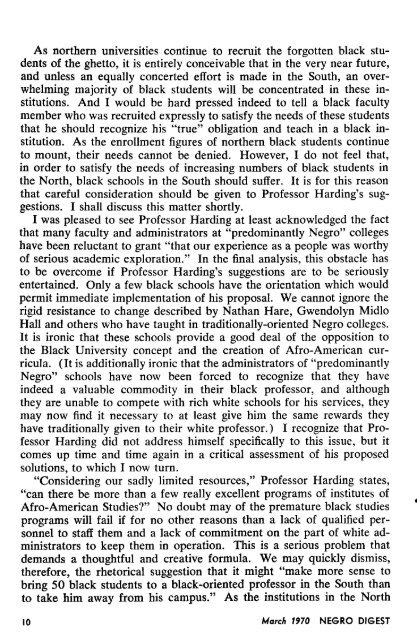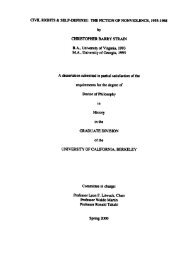Negro Digest - Freedom Archives
Negro Digest - Freedom Archives
Negro Digest - Freedom Archives
Create successful ePaper yourself
Turn your PDF publications into a flip-book with our unique Google optimized e-Paper software.
As northern universities continue to recruit the forgotten black students<br />
of the ghetto, it is entirely conceivable that in the very near future,<br />
and unless an equally concerted effort is made in the South, an overwhelming<br />
majority of black students will be concentrated in these institutions<br />
. And I would be hard pressed indeed to tell a black faculty<br />
member who was recruited expressly to satisfy the needs of these students<br />
that he should recognize his "true" obligation and teach in a black institution<br />
. As the enrollment figures of northern black students continue<br />
to mount, their needs cannot be denied . However, I do not feel that,<br />
in order to satisfy the needs of increasing numbers of black students in<br />
the North, black schools in the South should suffer . It is for this reason<br />
that careful consideration should be given to Professor Harding's suggestions<br />
. I shall discuss this matter shortly .<br />
I was pleased to see Professor Harding at least acknowledged the fact<br />
that many faculty and administrators at "predominantly <strong>Negro</strong>" colleges<br />
have been reluctant to grant "that our experience as a people was worthy<br />
of serious academic exploration ." In the final analysis, this obstacle has<br />
to be overcome if Professor Harding's suggestions are to be seriously<br />
entertained . Only a few black schools have the orientation which would<br />
permit immediate implementation of his proposal . We cannot ignore the<br />
rigid resistance to change described by Nathan Hare, Gwendolyn Midlo<br />
Hall and others who have taught in traditionally-oriented <strong>Negro</strong> colleges .<br />
It is ironic that these schools provide a good deal of the opposition to<br />
the Black University concept and the creation of Afro-American curricula<br />
. (It is additionally ironic that the administrators of "predominantly<br />
<strong>Negro</strong>" schools have now been forced to recognize that they have<br />
indeed a valuable commodity in their black professor, and although<br />
they are unable to compete with rich white schools for his services, they<br />
may now find it necessary to at least give him the same rewards they<br />
have traditionally given to their white professor . ) I recognize that Professor<br />
Harding did not address himself specifically to this issue, but it<br />
comes up time and time again in a critical assessment of his proposed<br />
solutions, to which I now turn .<br />
"Considering our sadly limited resources," Professor Harding states,<br />
"can there be more than a few really excellent programs of institutes of<br />
Afro-American Studies?" No doubt may of the premature black studies<br />
programs will fail if for no other reasons than a lack of qualified personnel<br />
to staff them and a lack of commitment on the part of white administrators<br />
to keep them in operation . This is a serious problem that<br />
demands a thoughtful and creative formula. We may quickly dismiss,<br />
therefore, the rhetorical suggestion that it might "make more sense to<br />
bring 50 black students to a black-oriented professor in the South than<br />
to take him away from his campus ." As the institutions in the North<br />
10 March 1970 NEGRO DIGEST
















